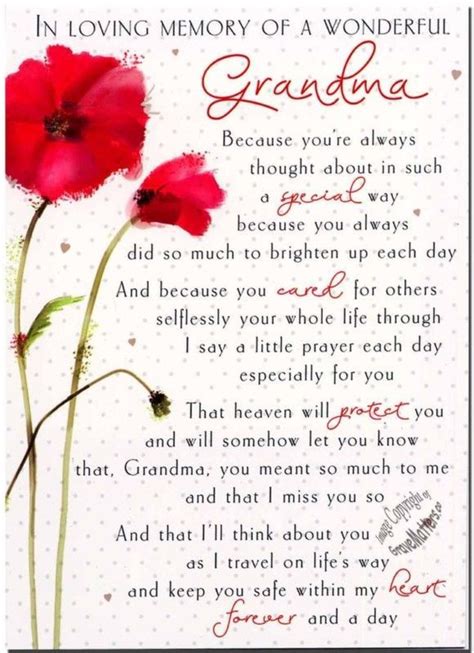Introduction

Losing a loved one is an immeasurable loss, and the passing of a grandparent can be especially profound. Grandmothers often hold a cherished place in our hearts, serving as beacons of wisdom, comfort, and unconditional love. The void left by their absence can feel immense and overwhelming.
The Pain of Grief
According to the American Psychological Association, grief is a complex emotional reaction to the loss of someone close. It can manifest in various ways, including feelings of sadness, anger, guilt, and disbelief. The intensity and duration of grief vary widely, depending on individual factors.
Coping with Grief
Coping with the loss of a grandmother requires both time and effort. There is no one-size-fits-all solution, but certain strategies can help:
- Allow yourself to feel:Suppressing emotions only prolongs pain. Embrace the full range of feelings associated with grief, knowing that they will eventually subside.
- Talk about your loss: Sharing your memories and emotions with trusted friends, family members, or a therapist can provide comfort and support.
- Take care of yourself: Prioritize your physical and emotional well-being during this difficult time. Engage in self-care practices such as exercise, meditation, and healthy eating.
- Seek professional help if needed: If grief becomes overwhelming or interferes with your daily functioning, don’t hesitate to seek professional support.
Common Mistakes to Avoid
- Isolating yourself: While withdrawing socially may initially feel comforting, maintaining connections with others is crucial for coping.
- Comparing your grief to others: Everyone experiences grief differently. Avoid making judgments or comparisons that can hinder your own healing process.
- Rushing the process: Grief takes time. Allow yourself to grieve at your own pace, without pressure to “move on” prematurely.
Creating Meaning from Loss
While the pain of losing a grandmother is undeniable, it is also possible to find meaning and purpose amidst the grief. Consider the following:
- Honor their memory: Celebrate their life by sharing stories, creating memorials, or engaging in activities that reflect their values.
- Live your life fully: Your grandmother would want you to live a happy and fulfilling life. Embrace their spirit by pursuing your passions and making the most of each moment.
- Help others: Turn your grief into a force for good. Volunteer your time, support organizations that provide grief counseling, or simply offer a listening ear to those who have also experienced loss.
Table 1: Common Characteristics of Grief
| Characteristic | Description |
|---|---|
| Shock and Disbelief | Difficulty comprehending the loss |
| Sadness | Pervasive feeling of emptiness and longing |
| Anger | Frustration and resentment directed at the loss or its circumstances |
| Guilt | Remorse over perceived shortcomings or regrets |
| Fear | Anxiety about the future and the unknown |
Table 2: Coping Mechanisms for Grief
| Mechanism | Description |
|---|---|
| Talking About the Loss | Sharing memories and emotions with others |
| Self-Care | Prioritizing physical and emotional well-being |
| Spiritual Activities | Finding solace in religious or spiritual practices |
| Journaling | Expressing thoughts and feelings through writing |
| Creative Expression | Engaging in art, music, or literature to process grief |
Table 3: Common Pitfalls in Coping with Grief
| Pitfall | Description |
|---|---|
| Suppressing Emotions | Holding back emotions only prolongs pain |
| Avoiding Social Support | Withdrawing from others can hinder healing |
| Comparing Grief | Judging or minimizing one’s own grief based on others’ experiences |
| Rushing the Process | Expecting grief to subside quickly can lead to unresolved emotions |
| Disengaging from Life | Letting grief consume one’s entire existence |
Table 4: Sources of Support for Coping with Grief
| Source | Description |
|---|---|
| Friends and Family | Trusted loved ones who provide emotional support |
| Support Groups | Structured gatherings for individuals experiencing similar losses |
| Therapists and Counselors | Professionals who offer guidance and coping mechanisms |
| Online Resources | Websites and forums dedicated to grief support |
| Spiritual Communities | Faith-based organizations that offer solace and support |
